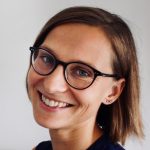
The object of Paula Oppermann’s PhD research is the Latvian Fascist Party Pērkonkrusts (Thunder Cross). The project investigates the history of the organisation from origins in the 1930s, when Pērkonkrusts leaders developed their antisemitic agenda, fostered the dehumanisation of Latvia’s Jewish citizens and thereby the disintegration of the whole society. It then illuminates the role of Pērkonkrusts during World War II. Its members cooperated on various levels in the German occupation and annihilation apparatus, but sometimes clashed with the occupiers over issues of political representation and power. The project also includes the post-war period, when many of the Latvian fascists found exile in North America and West Germany. There, they could rebrand themselves as Latvian patriots and anti-Bolsheviks, at the same time keeping their antisemitic beliefs and concealing their responsibility in paving the way to and participating in the Holocaust.
Paula Oppermann studied History and Baltic Languages at the University of Greifswald and completed an M.A in Holocaust and Genocide Studies at Uppsala University. She worked as a research assistant at Berlin’s Topography of Terror Documentation Centre curating a special exhibition entitled ‘Mass Shootings. The Holocaust Between the Baltic and the Black Sea 1941–1944’, and as a freelance sub-editor for the online-project “Pogrom: November 1938. Testimonies from “Kristallnacht” developed by the Wiener Library (London). Since 2017 Paula Oppermann is a PhD student in Central and East European Studies at the University of Glasgow. She has received fellowships at the Institute for Contemporary History (Munich), at the Institute for Eurasian Studies at the University of Uppsala, has been an EHRI-fellow at the German Federal Archives (Ludwigsburg/Berlin), and a junior fellow at the Vienna Wiesenthal Institute for the Study of the Holocaust. She has presented her work at international conferences including “Lessons and Legacies” (St. Louis) and “Beyond Camps and Forced Labour” (London), and published articles about the Holocaust and its commemoration in Latvia.